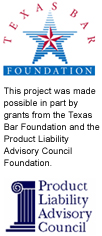
Tips for Reporting and Serving

The Trial Process
After you have been selected to serve on a jury, you will receive instruction from the judge on when to arrive; when there will be a break for lunch; and when you can expect to leave each day.
What to expect during the trial
Once the trial begins, it follows a format that may be familiar to you from TV shows and movies.
Opening Statements: Broad statements from attorneys
for each side that explain the case, outline evidence they will present,
and
discuss
the issues
you will
decide.
Presentation of Evidence: Evidence includes all testimony
of witnesses and any exhibits. The jury's decision on the case is based
on all of the evidence, so pay close attention. Any exhibits can be reviewed
by the jury during deliberations.
Rulings by the Judge: The judge may rule on questions
of law during the trial. The jurors are usually asked to leave
the courtroom while
lawyers
make legal arguments. These rulings are decided so that proper
evidence is considered
by the
jury.
Instruction to the Jury: The judge gives the jury
the Charge of the Court, which includes the question(s) the jury must
answer.
Closing Arguments: Attorneys for both sides use this
opportunity to summarize the
evidence. The lawyers will try
to persuade
the jury
to accept their
client's side or view of the case.
Jury Deliberations and Decision: The judge will send
the jury to the jury room to deliberate, after hearing the closing
arguments. During deliberations,
members of
the jury will decide how they will answer the questions presented
in the
Charge of the Court and return a final verdict.
Sequestered Juries: Juries are rarely sequestered
from the public. Before being assigned to a sequestered jury, you will
have an opportunity to discuss with the judge any conflicts that sequestration
might create.
Questions?
During the trial, jurors have the right to communicate with the judge regarding any matters affecting your deliberations, including physical comfort, special needs, any questions regarding evidence or the Charge of the Court.
Visit Juror Q&A or Links for more information.
This website was developed to help you better understand your role as a potential juror.
